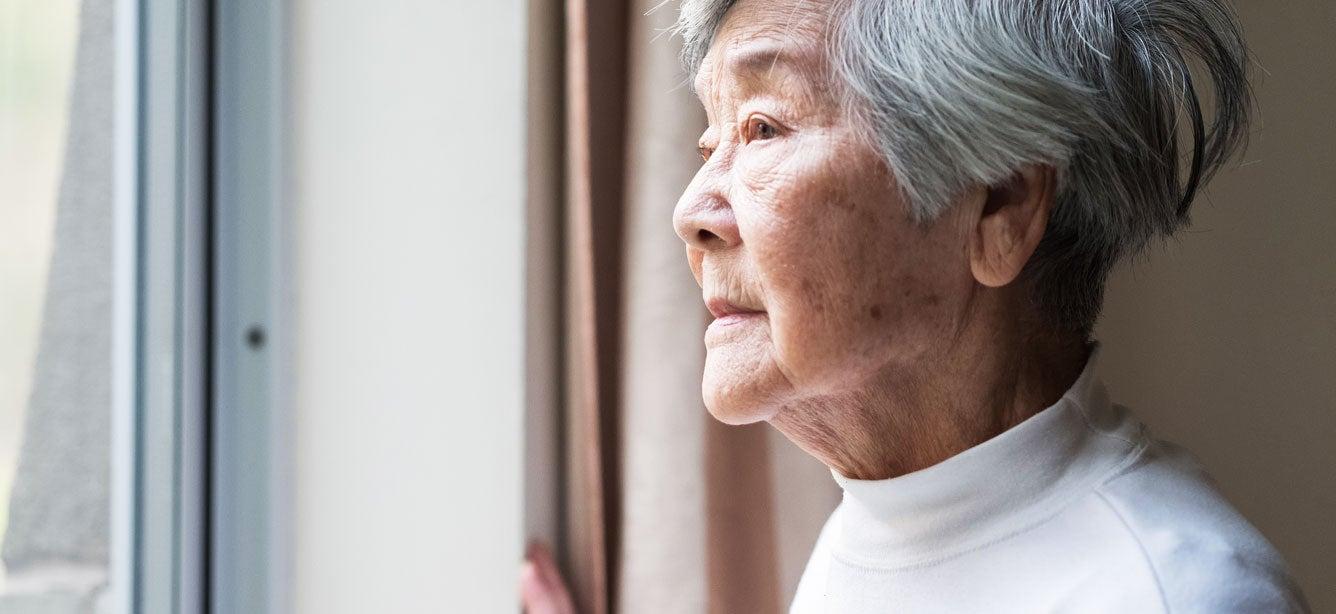
Related Topics
Nearly everyone gets a case of “the blues” now and then. But feeling low all the time is not a normal part of aging. If you’re experiencing intense feelings of hopelessness or sadness that don’t seem to go away, you may be clinically depressed. In recognition of National Older Adult Mental Health Awareness Day in May, we’re shining a spotlight on the issue of depression—a disorder that affects more than 8% (21 million) of U.S. adults each year.1
“Most older adults in the community are actually doing pretty well emotionally and their mental health is actually better than middle-aged adults, but there are many risk factors as we get older that can contribute to the possibility of depression,” Patrick Raue, a psychologist and professor at the University of Washington, told WBUR.
Chronic medical illnesses, disability, social isolation, lower income, all of those things can increase the risk for depression as we age,” Raue said.
What are the symptoms of depression in older adults?
Depression is a mood disorder and chronic medical condition. It’s characterized by feelings of sadness, anxiety, and/or apathy that last for at least two weeks and impact a person’s ability to function normally. Depression not only affects the way you feel, but also the way you think and act. Being clinically depressed is different from normal feelings of sadness or grief that occur after the loss of a loved one, for example.
How common is depression in older adults?
According to the Centers for Disease Control and Prevention (CDC), most older adults are not clinically depressed. However, that doesn’t make the issue any less challenging for those who suffer from it.
Estimates for major depression in older adults are as follows:
- 1% - 5% for older adults living in the general community
- 11.5% for older adults who are hospitalized
- 13.5% for older adults who require home health care2
What is the most common cause of depression in older adults?
Older adults have a higher risk of developing depression, but there is no single, specific cause. While they struggle with many of the same stressors as younger people, seniors also face a host of unique depression risk factors such as:
- Chronic conditions (about 80% of older adults have at least one chronic health condition, per the CDC)
- Decreased functional ability
- Reduced mobility
- Chronic pain
- Financial issues related to retirement
- Elder abuse
- Caregiver stress
- Lack of physical activity
- Loneliness
Older adults are also more likely to experience bereavement, which has also been linked to depression.
What are the symptoms of depression in older adults?
How do you know if you or a loved one is depressed? Some signs and symptoms of depression in seniors include:
- Apathy, or a sense of not caring about anything
- Persistent sadness
- Irritability
- Fatigue and low energy
- Feelings of guilt and worthlessness
- A sense of hopelessness
- Loss of interest in activities you once enjoyed
- Trouble concentrating and other cognitive changes
- Insomnia—or oversleeping
- Overeating—or a decrease in appetite
- Slower speech or movement
- Digestive problems that persist
- Physical pains that don't get better with treatment
- Recurring thoughts of death
Depression can be harder to detect and diagnose in seniors, since it often shows up differently in older age groups compared to younger ones. For example, fatigue can be erroneously attributed to old age. What’s more, the cognitive changes associated with untreated depression are often mistaken for dementia.
What is the most effective treatment for depression in older adults?
While depression can have a profound impact on your quality of life, this condition is highly treatable—even if it's severe. And depression treatment is found to work just as well in older adults as it does in younger populations.
If you think you may have depression, start by making an appointment with your health care provider. Your provider can first rule out other factors that may be causing your symptoms. For example, some medications and medical conditions can either trigger depression or depression-like symptoms in older adults. If there appear to be no underlying health problems causing your depression, you may be referred to a mental health professional for further evaluation and treatment.
There's no one-size-fits-all treatment for depression in older adults, but treatment approaches may include:
- Antidepressant medications: Selective serotonin reuptake inhibitors (SSRIs) are medications frequently prescribed for older adults with depression. These non-habit-forming medications are thought to help balance serotonin and other hormones that affect mood. In select situations, other psychotropic medications may be appropriate for treating depression.
- Counseling: Also called "talk therapy" or "psychotherapy," counseling can help you identify negative thought patterns and modify your thoughts and behaviors in order to cope with life challenges in a more positive, productive way. It’s typically done with a psychologist, psychiatrist, or other licensed mental health professional. Counseling is often combined with the use of antidepressant medications to help yield better results. Today, many counselors offer online therapy services. Similar to a virtual doctor’s appointment (telehealth), you use a computer, smartphone, or tablet to log in to a secure meeting space where you talk one-on-one with a therapist. Online therapy can be a great alternative to in-person therapy if you do not have reliable transportation or live far from providers’ offices.
- Electroconvulsive therapy (ECT): Practiced since the 1940s, ECT has been found to be highly effective for relieving major depression. During ECT, safe and mild electrical impulses are used to stimulate the brain. This treatment is usually reserved for adults with severe depression whose symptoms have not improved with other treatments. It’s been found particularly useful for treating depression in adults age 60 and over.
How can older adults protect their mental health?
In general, depression can't be prevented. However, there are steps you can take to help boost your mental wellness and emotional resilience:
- Get enough sleep: For older adults especially, getting plenty of restful sleep is vital. Lack of sleep can cause depressed feelings as well as irritability. Aim to get 7 to 9 hours each night.
- Stay active: Exercise can help improve your mood and strengthen your heart and lungs. You don't need to join a fancy gym, either. Activities like brisk walking, swimming, and light yard work are all great choices for older adults.
- Be social: Seniors are at greater risk for social isolation and loneliness, both of which can contribute to depression. Make an effort to stay in touch with friends and family to keep those connections alive. Visit your local senior center to see what programs and activities they offer. Consider volunteering at an animal shelter or food pantry to help you gain a greater sense of purpose while meeting new people.
- Eat right: Since older adults have unique nutrition needs, a healthy, balanced diet is key. Eating well can help you have more energy and prevent medical conditions that may indirectly increase your risk for depression.
It's ok to not be ok, let's normalize that together
Many people believe that seeking treatment for depression is a sign of weakness or failure.
But it's important to understand that depression is not a choice. It’s not something you can control.
Just as you'd treat diabetes and hypertension, clinical depression requires medical intervention.
The good news is that once your depression is properly treated, you can quickly regain your quality of life and even cognitive abilities you might have lost. That’s why it’s important to let your family, friends, and health care provider know right away if you’re experiencing depression symptoms. You’re not alone—help is available.
If you’re having thoughts about suicide or harming yourself:
- Contact a trusted friend, family member, or health care provider immediately.
- Contact the Suicide & Crisis Lifeline by dialing or texting 988 on your phone to speak with a counselor who is specially trained in suicide prevention. This is free, confidential, and available to everyone in the U.S. 24 hours a day, 7 days a week.
Sources
1. Mental Health America. Quick Facts and Statistics About Mental Health. Found on the internet at https://mhanational.org/mentalhealthfacts
2. Depression is Not a Normal Part of Growing Older, Centers for Disease Control and Prevention. Found on the internet at https://www.cdc.gov/aging/depression/index.html



